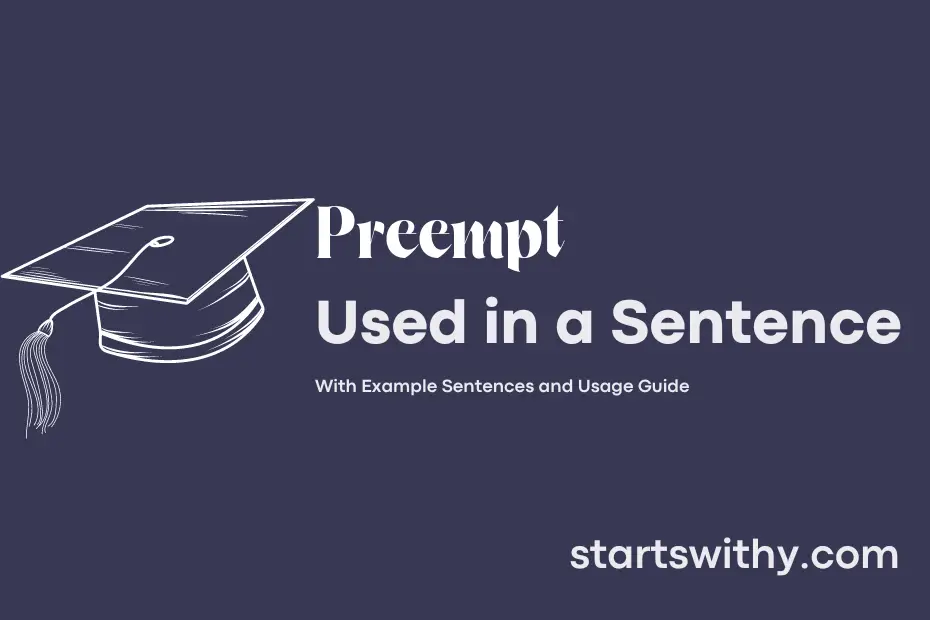Preempt means to take action before an anticipated event occurs in order to prevent it from happening. It involves anticipating a situation and acting in advance to avoid potential negative consequences.
This proactive approach is often employed in various fields such as business, politics, and warfare to deter or mitigate potential threats. Through preemptive strategies, individuals and organizations aim to stay ahead of challenges and secure favorable outcomes.
7 Examples Of Preempt Used In a Sentence For Kids
- Preempt means to do something before someone else does.
- I wanted to preempt my friend by reaching the swing first.
- Let’s try to preempt the rain by carrying an umbrella with us.
- The clever fox was able to preempt the rabbit’s plan to escape.
- Remember to preempt any fights by talking calmly to your friends.
- We can preempt the heat by wearing our sunscreen before going out.
- The superhero was able to preempt the villain’s evil plot and save the city.
14 Sentences with Preempt Examples
- Students should preempt scheduling conflicts by planning their class timings carefully.
- It is always advisable to preempt any potential technical glitches before giving a virtual presentation.
- A well-prepared student can preempt difficult exam questions by reviewing past papers.
- To avoid last-minute stress, it is important to preempt printing issues by checking the printer in advance.
- Students can preempt misunderstandings by clarifying instructions with their professors.
- It is a good practice to preempt network connectivity issues by having backup options for online assignments.
- By maintaining a healthy study routine, students can preempt burnout during exam season.
- To stay ahead in projects, it is essential to preempt potential roadblocks and have contingency plans in place.
- Students can preempt group project conflicts by establishing clear communication channels and expectations.
- When studying for exams, it is helpful to preempt distractions by finding a quiet study space.
- Preempting last-minute library closures by borrowing required books well in advance can save time and stress.
- It is wise to preempt academic struggles by seeking help from tutors or study groups early on.
- Students can preempt financial difficulties by creating a budget and sticking to it throughout the semester.
- By regularly reviewing course material, students can preempt cramming sessions before exams.
How To Use Preempt in Sentences?
Preempt means to take action in order to prevent something from happening. When using Preempt in a sentence, consider the following tips:
-
Identify the situation that you want to prevent from occurring. For example, “I decided to preempt any confusion by providing a detailed explanation beforehand.”
-
Use Preempt in a way that shows you are taking a proactive approach to avoid a potential problem. For instance, “She quickly preempted any objections by addressing them in her presentation.”
-
Remember to use Preempt with verbs that indicate a proactive action or decision. You can say, “The company made a bold move to preempt any competition in the market.”
-
You can also use preempt in a sentence to describe taking control of a situation before others have a chance to do so. For example, “The team strategically preempted their opponents’ plan by launching their campaign first.”
-
Practice using preempt in different contexts to become more comfortable incorporating it into your writing or speaking. This will help you effectively convey the concept of taking preventive action in various situations.
By following these tips, you can confidently use Preempt in a sentence to express proactive decision-making and a willingness to take control of a situation before potential issues arise.
Conclusion
In conclusion, preemptive sentences are used to anticipate and address potential outcomes before they occur. They serve to prevent misunderstandings, conflicts, or future problems by taking proactive measures. By incorporating preemptive statements in communication, individuals can foster clarity, avoid confusion, and ensure their message is effectively conveyed.
The importance of preemptive sentences lies in their ability to set expectations, manage risks, and promote effective communication. Whether in professional settings, personal relationships, or written communication, preemptive statements can help establish understanding, prevent misinterpretations, and create a more streamlined exchange of information. Embracing preemptive language can enhance clarity, foster strong relationships, and improve overall communication efforts.



